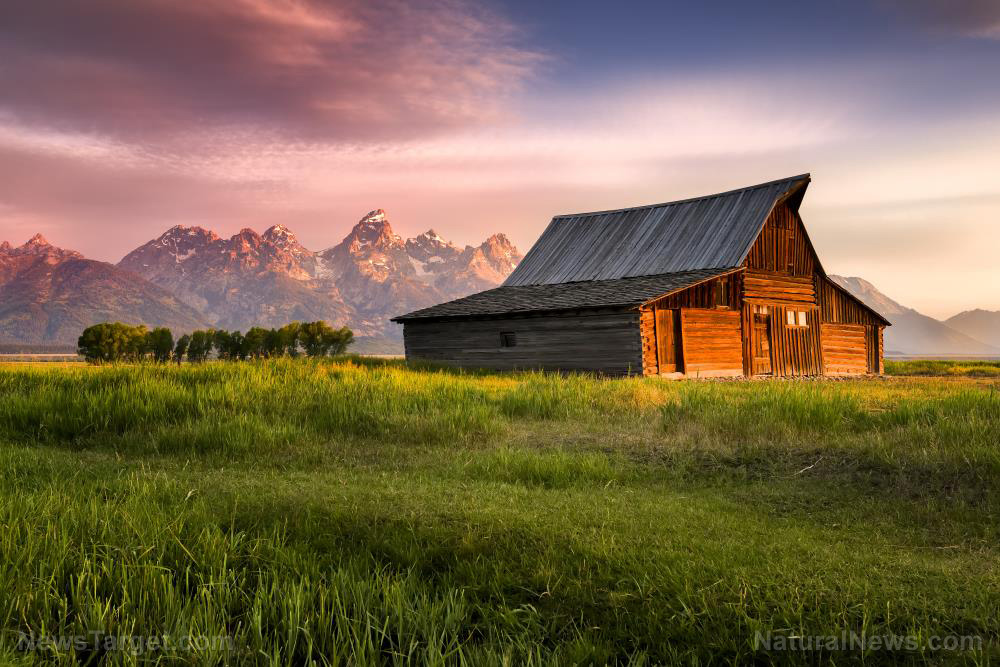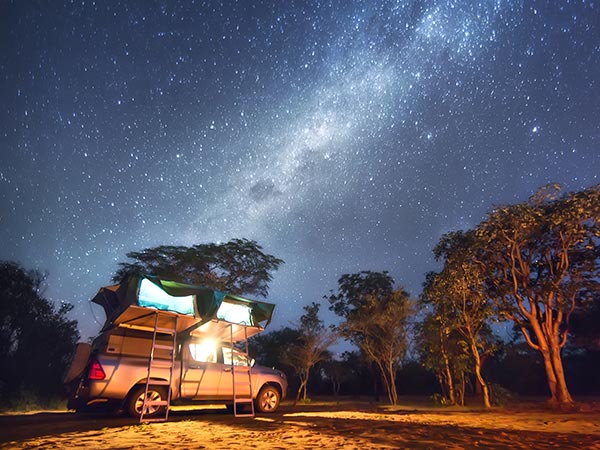
Tornadoes are widely considered as the nature's most violent storms – carrying winds up to 300 miles per hour that can level buildings and carry cars 80 feet or more through the air. They are also often accompanied by flash floods, hail, heavy rains and lightning.
When a tornado strikes, your every choice can mean the difference between life and death. Read on to learn some tips on how to prepare for and survive a tornado. (h/t to MortonsOnTheMove.com)
Move immediately to an underground shelter whenever possible
- At the first sign of a tornado, or if a tornado warning has been issued, stop whatever you're doing and seek appropriate shelter immediately, even if you don't see a tornado.
- An underground tornado shelter or a specially designed tornado-safe room is the safest place to be during a tornado. Some homes, businesses and schools in areas prone to tornadoes have these shelters. (Related: Survival 101: Reasons to set up a safe room or storm shelter.)
- If a tornado shelter is not available, go to the basement of a building. Stay away from windows, and cover yourself with a mattress, cushions or sleeping bags. If possible, get under a heavy table that can protect you from falling debris.
Stay in a windowless room on the lowest level if you can't go underground
- In a building with no basement, avoid windows and go to the lowest floor. Alternatively, seek shelter in a small room that is located near the center of the house, under a stairwell, or in an interior hallway with no windows.
- Regardless of where you are, crouch low to the ground or lie down, face down and cover your head with your hands and arms. Take cover under a strong table if possible, and cover yourself with a mattress, cushions or blankets.
- Bathrooms can be particularly effective because they are fortified by pipes and you can lie in a bathtub.
- Stay out of elevators, as you could be trapped in them if power is lost. Instead, use the stairs to descend to the lowest floor.
Know where NOT to seek shelter
The following locations should be your absolute last resort during a tornado, as they all have the potential to be severely damaged by high winds:
- Buildings with flat, wide roofs, such as cafeterias, gyms, etc.
- Mobile homes
- Open rooms with lots of windows
- Tall buildings
Remain in your shelter until the danger of tornadoes has passed
- Keep in mind that multiple tornadoes often form in an area, and it may not be safe to leave your shelter even after one tornado has passed.
- Even if the last tornado has passed, you should still use common sense. If the surrounding area looks dangerous, it may be safer to remain in your shelter.
Exit your shelter carefully
- Exercise caution moving around in a tornado-stricken area. After a tornado strikes, you are likely to encounter hazards, such as flooding, falling debris, collapsing buildings and blocked roads.
- Be alert and proceed with caution, as there may be sharp objects scattered around.
- Avoid fallen power lines and puddles with wires in them, and avoid using matches or lighters in case of natural gas or fuel tank leaks.
- Do not enter damaged buildings under any circumstances, as they may be prone to collapse.
Know the warning signs of potential tornadoes
Most tornadoes are accompanied by thunderstorms, hail and high winds, but there are other things to look out for as well:
- Dark, green-tinted clouds
- Debris and dust "walls"
- Funnels or rotating clouds
- Loud roaring noises, like airplanes taking off
- "Wall clouds," where the base of a thunderhead seems to lower
Drive to the nearest shelter
- If you hear the warning and it is still safe to drive, get to the closest building you can find. Keep your seat belt on and get off the open road as soon as you can. Turn on your high beams and move immediately to some sort of structure, preferably with a basement.
- If you can see the tornado and/or flying debris makes driving dangerous, stay put.
- If your car is pelted with debris while driving, this is your cue to pull over.
- Never try to out-drive a tornado in an urban environment; get into any building as shelter instead.
Stay in your car if there's absolutely no other structure nearby
- Fasten your seatbelt and duck down below the window line. Take your coat, a blanket, a pillow, etc. and put it over your head and back, and hold your hands over your head to protect your skull.
- Stay put until you can safely drive to a shelter.
- Be on the lookout for multiple tornadoes. Again, there may be multiple tornadoes after the first one has passed.
Pay attention to tornado watches and warnings
A tornado watch means that there is a threat of tornadoes within your area and that you should keep an eye on the news. A tornado warning is much more serious and means that a sign of rotation has been detected.
- Whenever you see a tornado watch, keep the television or radio on for further news.
- Whenever you hear a tornado warning, get to cover immediately.
Create an emergency plan in your house
- Make a plan for where to go during a tornado. Have this plan in place and practice before you need it. Everyone you live with should know exactly which room of the house to go to in the event of a tornado. Make sure that this room is stocked with all the necessary provisions.
- Note the places in each room where you should seek cover if you cannot escape, like under tables or cabinets. Are there any places where you would be trapped or in extra danger, such as upstairs rooms? Are there ways to make them safe, such as stashing a cheap rope ladder?
- Do you have first aid kits, crowbars, fire extinguishers or other special equipment around the house that people should know how to find?
Check your emergency supplies
- Keep at least a three-day food and water supply in an emergency, such as losing power and water during a tornado outbreak.
- Your emergency supplies should include your "lights out" box, which contains the first things you'll reach for when you need to illuminate the home in the event of a power outage.
- Important documents such as birth certificates, titles, Social Security cards and insurance papers should be kept in a fire-proof and waterproof safe.
Clear your lawn of potentially dangerous debris
- Cut away dead or damaged tree branches that could be ripped off in high winds.
- Tie down or secure lawn furniture.
- Keep your lawn free of anything that could turn into a weapon when picked up by a tornado, such as glass gazing balls.
Consider building a tornado/storm shelter
If you live in a high-risk area and tornadoes are a regular part of your local weather, buying or building a shelter is well worth the cost. The Federal Emergency Management Agency (FEMA) has produced a guide to building a shelter yourself as well.
Visit Preparedness.news for more survival tips.
Watch this video to learn how to survive a tornado – and how to recognize it.
This video is from the Daily Videos channel on Brighteon.com.
More related stories:
Surviving natural disasters: How to prepare for 5 extreme weather.
When the storm subsides: What to do in the aftermath of a disaster.
Here’s why weather spotting classes are a must for preppers.
Sources include:
Please contact us for more information.



















